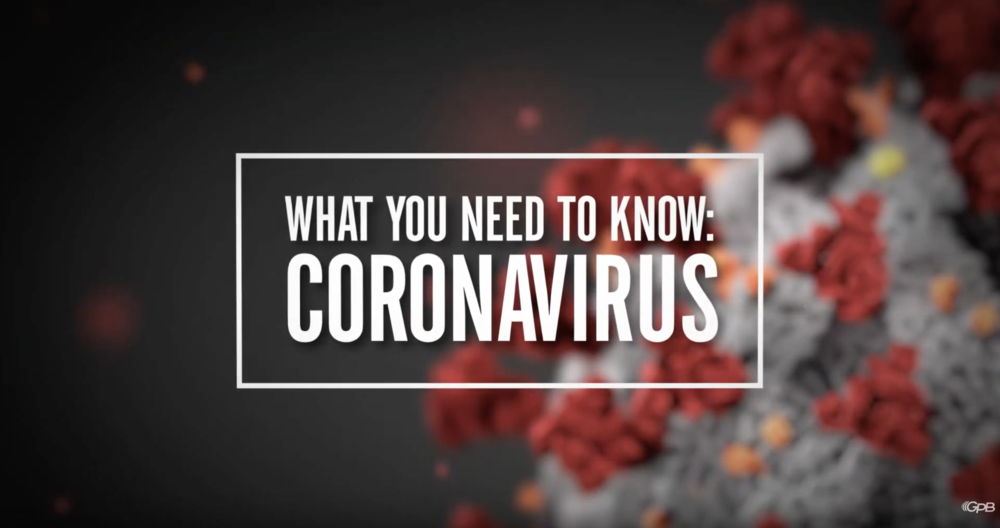Section Branding
Header Content
What You Need To Know: Help With Unemployment Benefits
Primary Content
Georgia Public Broadcasting’s new series What You Need To Know: Coronavirus provides succinct, fact-based information to help you get through the coronavirus pandemic with your health and sanity intact.
Taylor Gantt spoke with Georgia Labor Commissioner Mark Butler about the effect the COVID-19 outbreak is having on Georgia's employment market and how to quickly tap into unemployment benefits if needed.
Commissioner, what would you say your first piece of advice would be to people who are on a long hiatus from work or have been let go recently and really aren't sure what the next step is?
Well, first of all, there's going to be two — actually about three ways that you can file for unemployment right now if you've been laid off or temporarily laid off.
First of all, if your employer has done a mass layoff, they are supposed to be filing on your behalf. It's doing what we call a partial layoff. That terminology doesn't mean anything to most people, but what it basically means is if your employer has temporarily laid you off, meaning that they haven't actually terminated you and they're expecting you to come back at some point, then they would need to file on your behalf.
We actually mandated that through an emergency rule Monday a week ago. The reason why we did that is it's a much faster process and it also will cut down on some of the excessive traffic of having a bunch of individuals file each person because we can get it all in a batch filing just from the employer. Not only does it streamline as far as a submission, but you can also get your benefits approved much faster.
Now, if you're not in that type of situation, then you have two methods and one of them is much better than the other. First of all, we have had to close access to the public to our career centers. We had to do that for several reasons. And the most important one is for health reasons because the waiting areas and most of our offices are somewhat compact and we did not want our customers that close to each other because we were getting some early reports of people that had been told to go home and self-quarantine.
But before they went home, they were coming into our offices to file unemployment which puts other people at risk but also puts our staff at risk. And we saw early on that we needed to shut that down because if our staff has to go home because they have to self-quarantine, that's going to be fewer and fewer people that we have to actually do the work that needs to be done right now. So we did that.
The good news is, is one of the changes that we made after the recession was over and my staff came in to take over the Department of Labor is we actually instituted an online claims process, which is why we're telling everybody to do all your clients right now online. That is the most efficient and best manner.
Yes, there will be some peak times when a lot of people are on the system all at once that you may experience some slowdowns. I talked to someone the other day and he said, "I was working on it and it was taking a while. But if I was patient, then the screen would eventually load." Because we're seeing unprecedented volume on this system right now. We were talking the other day [that] if you were going to create a stress test for our system to see if you could break it, this is it.
The good news is the system has not broken. We did have a glitch in the middle of last week or near the end of the week and we actually found out where that was coming from. It was actually a piece of hardware that was having issues and we have actually resolved that. So that's the best way.
But now, if you're one of those individuals that have no access to the internet — which right now, by the way, 93% of all claims have been filed online before this even happened— you can call your local career center.
You can look up that number and get that number and you can call them directly and somebody can help do your claim over the phone, which is something we haven't had to do in probably 25 years. So, we're actually having to go back and develop scripts and things like that to make sure that we've got everything covered. We have streamlined the whole process so you don't have to show up in person for anything. There is no work search required.
We made it about as easy as humanly possible for the claimant and with as few things to get in the way. And we're going to continue to add even more things as we're getting permission and also working with USDOL and the governor's office in order to streamline the process and maybe even add some tricks here and there to even enhance things.
Commissioner, you actually mentioned the governor. So as of noon today, Gov. Kemp has ordered some businesses to close. That was an executive order last night, but it's not called for a statewide shutdown of businesses yet, even though the Georgia Municipal Association has recommended that the towns and cities in Georgia work towards closing nonessential businesses. So it's definitely a debate that's going back and forth as to when or if the appropriate time for that is. Where do you weigh in on that, Commissioner?
Well, I'm trying not to weigh on it at all, mainly because I don't have access to the same experts that he does, the health experts. And so I'm just gonna have to kind of lean on the information he's hearing because I think a lot of people think they know what's going on and they're going to guess at it, but I'm not one of those kinds of people.
That happens to us all the time. People say "Well, you all should be doing this and doing that" and you really just don't know unless you have the information. So I just have to trust that the people with the information are making the right calls.
What do you think about Georgia's ability to bounce back from an economic downturn like this that certainly is kind of unexpected for many or most people? How do you think the state can bounce back economically? Because it's been strong month after month until we had kind of a road bump like this.
Well, I think we can bounce back pretty quickly depending on the length of this and how it's affected. I think right now, as long as we get everybody in Washington, D.C. to get along for about two minutes, we can get some things put out there that can stabilize a lot of businesses. Hopefully, we're going to see a lot of things like lending institutions and landlords.
Everybody actually needs to have a lot of patience with this and have some understanding. So just like, you know, you get a situation where somebody can't make a loan payment because of this [and] because the revenue has dropped to nothing. I would hope they wouldn't get foreclosed on. That would be kind of silly because everybody's in the same boat.
Now, actually doing those kinds of actions would actually lead to a real recession. So I think some of the actions we're seeing in D.C. right now with some of the loans and the propping up and different things... I know a lot of people are criticizing some of the help that they're seeing as some of these bills for businesses.
But the businesses are the ones that are employing people. Take, for example, Delta. Delta's got thousands and thousands of employees right here in Georgia. We definitely don't want to see them go under because those jobs, you could not replace them anytime soon. And those people would be out of work for a very, very long time.
So I think everybody's going to be very patient in this process going forward. And understand that this is unprecedented. You can't compare this to anything else that's ever happened before. And everything [that] has happened is happening so much faster than what anybody could anticipate.
So, Commissioner, let's end the conversation on this. What are some bright spots in our state's economy right now? Are there any job sectors that are seeing growth or resilience despite the things that are going on right now?
Well, I haven't actually checked on actual numbers because when you do check out some numbers, you actually have to stop people from doing the necessary jobs order to pull that. So we're not pulling any numbers until later this week when we have some time, but obviously, healthcare for [the] most part is always recession-proof in this case.
The demand is overwhelming. And obviously you're seeing some retailers, people in transportation, warehousing, logistics, a lot of that is still kind of going. That's one of those areas that we really have to pay attention to right now and make sure we're supporting them in any way we can.
As a matter of fact, we're taking a look at right now at the lines of logistics for our truck drivers, because as you hear these different stories about restaurants and things like that are closing down on some of these exits, we've got to find ways to get some financial supports to those businesses to keep them open because these truck drivers, they know they can't go 24/7. They have to stop. They have to have breaks. They have to have meals. And we have to make sure that we keep those lines open and the supports for them open.
So there's a lot of little things that people don't think about in these types of times and it is our job to think about constantly. Those types of services are still getting those necessary things— whether it's getting drugs to the hospitals or to drugstores or food to the grocery stores— all those things are still doing a lot of work. And we're hearing a lot of demand for additional hiring.
As a matter of fact, my daughter lives in New York. She's had a complete shutdown and she's actually visiting with friends in Jersey City. And she just got laid off yesterday. And so she thought, "Well, what I'm going to do?" And then, her boyfriend was like, "Well, the grocery store around the corner is hiring right now." And I'm like, "You might need to go talk to them." Because she's young, very healthy. And they're gonna need help because people still are going to need these supplies. It's very challenging times right now.


